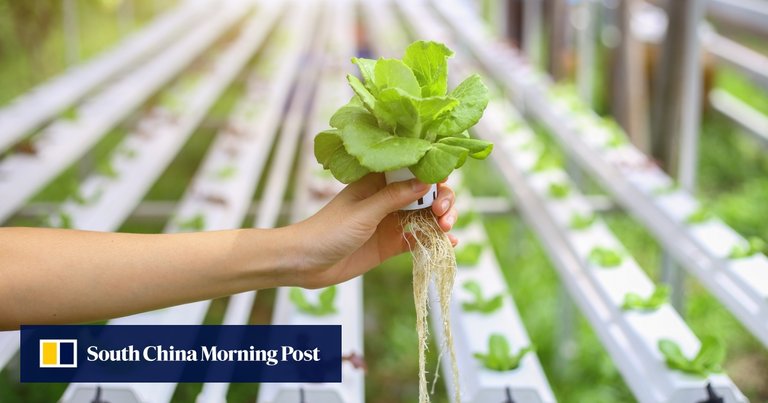
Japanese experts make a breakthrough in farming technology, using polymer film to grow food.
In a tiny room inside the Mebiol Research and Development Center, a little over an hour outside of Tokyo, baby Cos lettuce leaves are growing in a tray under magenta-coloured lights. On another shelf, a miniature garden of microgreens is blooming across the surface of a salad dish. The seedlings have been cultivated without soil – atop a thin, transparent polymer film.
“Can you see the roots?” asks Hiroshi Yoshioka, Mebiol’s vice-president, lifting the edge of the plant-covered film to reveal a tangle of fine, pale filaments. He pulls the sheet off the plate and holds it in front of him like a leafy green carpet.
The polymer film is the key to a cutting-edge farming method that makes it possible to grow fruits and vegetables on practically any flat exterior. Made of hydrogel – a super absorbent material typically used in household products such as disposable diapers – the film works by soaking up water and nutrients through a multitude of nano-sized pores measuring one millionth of a millimetre in diameter. Plants grow on top of the film, but instead of digging into the ground, the roots spread across the surface of the membrane in wispy, fan-like formations.

Film farming is the brainchild of Yuichi Mori, the chemical physicist who founded Mebiol in 1995.
Drop Farm grows boutique tomatoes in Ibaraki Prefecture, using polymer film farming technique. Photo: Drop Farm
Drop Farm grows boutique tomatoes in Ibaraki Prefecture, using polymer film farming technique. Photo: Drop Farm
Drop Farm grows boutique tomatoes in Ibaraki Prefecture, using polymer film farming technique. Photo: Drop Farm
Drop Farm grows boutique tomatoes in Ibaraki Prefecture, using polymer film farming technique. Photo: Drop Farm
Because the polymer film holds on to water molecules, the plants on top have to work hard to absorb water and nutrients.
Because the polymer film holds on to water molecules, the plants on top have to work hard to absorb water and nutrients.
Plants are cultivated in hydroponic system
Plants are cultivated in hydroponic system
Because the polymer film holds on to water molecules, the plants on top have to work hard to absorb water and nutrients, resulting in a better harvest.
Because the polymer film holds on to water molecules, the plants on top have to work hard to absorb water and nutrients, resulting in a better harvest.
Because the polymer film holds on to water molecules, the plants on top have to work hard to absorb water and nutrients, resulting in sweeter strawberries.
Because the polymer film holds on to water molecules, the plants on top have to work hard to absorb water and nutrients, resulting in sweeter strawberries.
Cucumbers can also be grown using the polymer film farming technique.
Cucumbers can also be grown using the polymer film farming technique.
Lettuce grown using film farming technique are more juicy and nutritious.
Lettuce grown using film farming technique are more juicy and nutritious.
Japanese experts make a breakthrough in farming technology, using polymer film to grow food
Japanese experts make a breakthrough in farming technology, using polymer film to grow food
1 / 9
In a tiny room inside the Mebiol Research and Development Center, a little over an hour outside of Tokyo, baby Cos lettuce leaves are growing in a tray under magenta-coloured lights. On another shelf, a miniature garden of microgreens is blooming across the surface of a salad dish. The seedlings have been cultivated without soil – atop a thin, transparent polymer film.
“Can you see the roots?” asks Hiroshi Yoshioka, Mebiol’s vice-president, lifting the edge of the plant-covered film to reveal a tangle of fine, pale filaments. He pulls the sheet off the plate and holds it in front of him like a leafy green carpet.
The polymer film is the key to a cutting-edge farming method that makes it possible to grow fruits and vegetables on practically any flat exterior. Made of hydrogel – a super absorbent material typically used in household products such as disposable diapers – the film works by soaking up water and nutrients through a multitude of nano-sized pores measuring one millionth of a millimetre in diameter. Plants grow on top of the film, but instead of digging into the ground, the roots spread across the surface of the membrane in wispy, fan-like formations.
Film farming is the brainchild of Yuichi Mori (pictured), the chemical physicist who founded Mebiol in 1995.
A spry 75-year-old in a crisp blue-and-white striped shirt and navy blazer, Mori spent the majority of his career developing polymer technologies for the medical industry. However, he had long been fascinated by plant biology and found inspiration in the adaptability of the vegetable kingdom.
“In many ways, plants are more remarkable than humans,” he observes, pointing out that they sustain life on earth by providing a source of food for animals and removing excess CO2 from the air. “I was always thinking of how to maximise the power of plants.”
The idea of applying polymer technology to agriculture that came to him as he was building an artificial kidney nearly 20 years ago. He wondered if the same mechanisms used to construct synthetic blood vessels and membrane filters could be used as a growth medium for vegetables.
Source of shared Link

Interesting and will be so much effective.
I think, this technology will impact a lot on the agro technology. Farming will be possible now in cities as well.